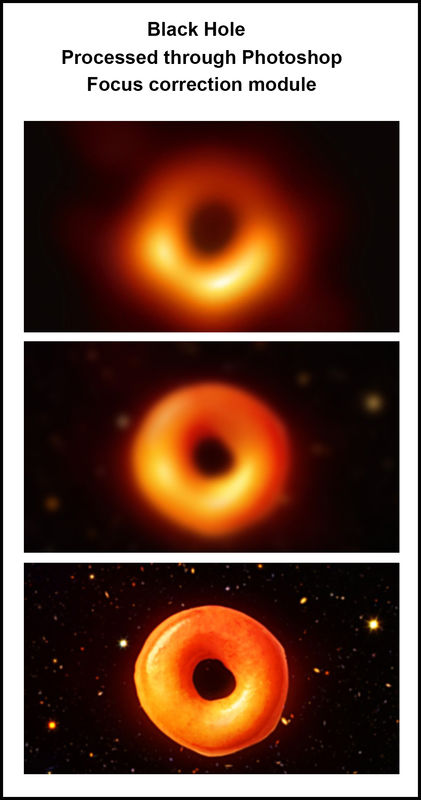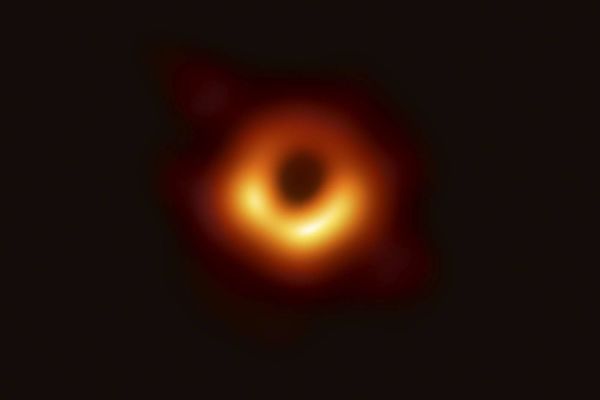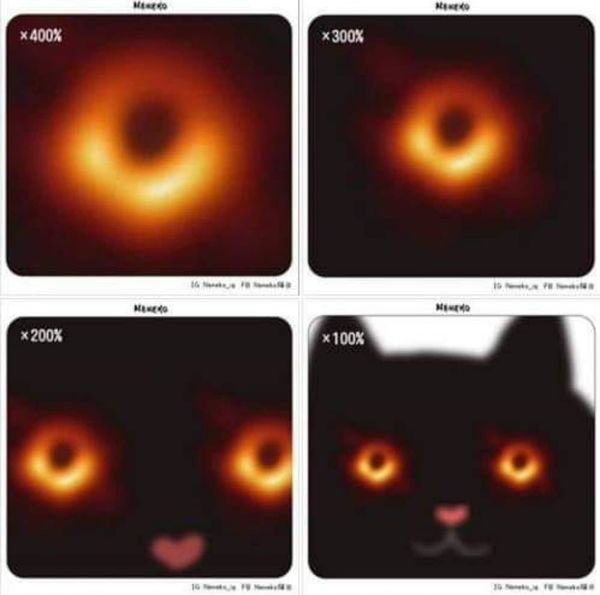How Do You Take a Picture of a Black Hole? With a Telescope as Big as the Earth
Apr 10, 2019 09:06:33 #
From NYTimes. Maybe I understand some of this?
Enjoy,
Mark
https://www.nytimes.com/2018/10/04/magazine/how-do-you-take-a-picture-of-a-black-hole-with-a-telescope-as-big-as-the-earth.html?emc=edit_NN_p_20190410&nl=morning-briefing&nlid=68671452tion%3DtopNews§ion=topNews&te=1
And, here is the image. Funny, the hole is black!!
More information via internet:
https://www.msn.com/en-us/news/technology/remarkable-image-of-black-hole-released-in-astrophysics-breakthrough/ar-BBVMHBs?li=BBnb7Kz
Enjoy,
Mark
https://www.nytimes.com/2018/10/04/magazine/how-do-you-take-a-picture-of-a-black-hole-with-a-telescope-as-big-as-the-earth.html?emc=edit_NN_p_20190410&nl=morning-briefing&nlid=68671452tion%3DtopNews§ion=topNews&te=1
And, here is the image. Funny, the hole is black!!
More information via internet:
https://www.msn.com/en-us/news/technology/remarkable-image-of-black-hole-released-in-astrophysics-breakthrough/ar-BBVMHBs?li=BBnb7Kz
Apr 10, 2019 09:24:45 #
berchman
Loc: South Central PA
markngolf wrote:
From NYTimes. Maybe I understand some of this?
Enjoy,
Mark
https://www.nytimes.com/2018/10/04/magazine/how-do-you-take-a-picture-of-a-black-hole-with-a-telescope-as-big-as-the-earth.html?emc=edit_NN_p_20190410&nl=morning-briefing&nlid=68671452tion%3DtopNews§ion=topNews&te=1
Enjoy,
Mark
https://www.nytimes.com/2018/10/04/magazine/how-do-you-take-a-picture-of-a-black-hole-with-a-telescope-as-big-as-the-earth.html?emc=edit_NN_p_20190410&nl=morning-briefing&nlid=68671452tion%3DtopNews§ion=topNews&te=1
I don't understand this at all. I don't understand how astronomers/cosmologists come up with these findings; I don't understand the findings. I do believe that the universe is one great mystery which will always remain beyond comprehension.
Apr 10, 2019 09:26:26 #
Apr 10, 2019 10:16:34 #
berchman wrote:
I don't understand this at all. I don't understand how astronomers/cosmologists come up with these findings; I don't understand the findings. I do believe that the universe is one great mystery which will always remain beyond comprehension.
The astronomers and astrophysicists rely heavily on mathematics and physics to determine the presence of black holes and other phenomena which aren't within the visual spectrum.
Stars, planets, asteroids, etc., all follow predictable orbits, and they emit light in frequencies which translates into chemical makeup. As an example, the earth revolves around the sun in a predictable orbit, the moon orbits in a predictable orbit, and our solar system is moving predictably within the Milky Way. Chemicals such as hydrogen, lithium, oxygen, carbon, etc., all emit light in fixed frequencies. It's how astronomers know that stars burn hydrogen and turn it into helium, then lithium, etc., until the elements turn to iron, which cause the star to collapse and explode.
One of the things that's been limiting in astronomy, is the ability to see further into the past. While the Hubble Space Telescope, and others, have been huge factors in understanding the universe, they have their limits because of the size limits on their mirrors and sensors. With the advent of very powerful computers, it's become possible to align telescopes on earth to focus narrowly on sections of space, in order to study the stars, black holes, galaxy size objects, etc. Simply put, they network just like the computers on a LAN, but globally.
There have also been gains in the ability to focus segmented mirrors in a single telescope, instead of the solid mirrors made in the past. This allows single observatories to see more.
One of my favorite cable channels is the Science Channel. They have a number of series on astronomy, astrophysics, etc., which provide in layman's language just how the universe is studied and observed.
Like others, the concepts are too large and complex for me to comprehend, but like all knowledge, you have to take it in small bites, digest it, and go on. No one person can comprehend it all, but if you listen to enough knowledgeable folks, you can understand the broad concepts.
PS - I just heard a story on the radio from one of the astronomers, and he stated that they used an atomic clock to coordinate the radio telescopes, so that the effective size was nearly as large as a galaxy. The atomic clock used has an accuracy to within one second in ten million years.
Apr 10, 2019 12:33:43 #
Apr 11, 2019 07:27:40 #
When you bring the black hole into focus, it becomes much easier to understand.

Apr 11, 2019 07:56:05 #
ottopj
Loc: Annapolis, MD USA
berchman wrote:
I don't understand this at all. I don't understand how astronomers/cosmologists come up with these findings; I don't understand the findings. I do believe that the universe is one great mystery which will always remain beyond comprehension.
Luddite!
Apr 11, 2019 08:16:11 #
Dan Thornton wrote:
When you bring the black hole into focus, it becomes much easier to understand.


Mark
Apr 11, 2019 10:09:33 #
Apr 11, 2019 14:17:44 #
Apr 11, 2019 15:09:25 #
Apr 11, 2019 19:41:50 #
Apr 11, 2019 19:51:59 #
Apr 11, 2019 21:09:03 #
Looks like a fuzzy eclipse of the sun. I thought all light was sucked up by a black-hole. Seems to me the light surrounding the black-hole should be spinning into the vortex not just surrounding it like the light surrounding an eclipse. But it's a nice mathematical theory that everyone wants apiece of with no real physical proof of.
Apr 12, 2019 03:22:54 #
You just need to understand basic quantum physics - then it all comes clear!
If you want to reply, then register here. Registration is free and your account is created instantly, so you can post right away.









